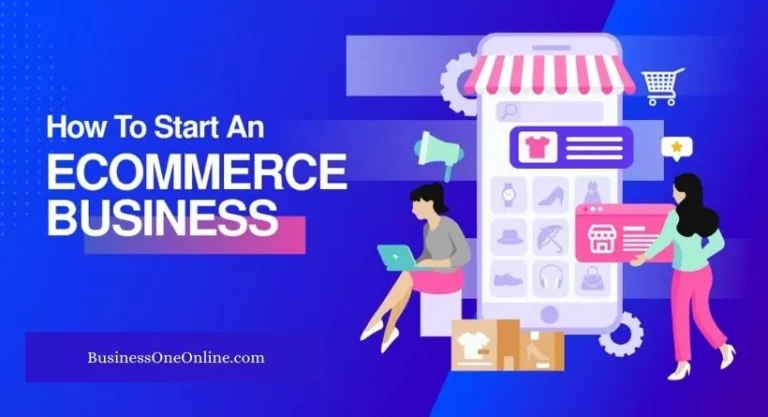Are you considering starting an Ecommerce business in 2023? If yes, you might be feeling overwhelmed with the idea of launching your own online store. You might have several questions about how to get started, what strategies to implement, and how to stand out in a crowded market. But don’t worry! In this blog post, we will provide you with a comprehensive guide on how to start an Ecommerce business in 2023.
Starting an Ecommerce business can be a daunting task, but it doesn’t have to be. With the right strategies and techniques, you can launch a successful online store and achieve your business goals. We promise to provide you with a step-by-step solution to the challenges you might face while starting an Ecommerce business.
Our solution involves thorough research, planning, and execution. We will walk you through the entire process, from finding your niche to creating a website, managing inventory, marketing your products, and optimizing your site for search engines.
Now, let’s address the pain point. Are you worried about the fierce competition in the Ecommerce market? Are you afraid that you might not be able to stand out among established players? Don’t worry; we have got you covered. Our solution includes identifying your unique selling proposition and leveraging it to differentiate your brand from competitors.
Finding Your Niche

Research Your Market
Embarking on your ecommerce business journey starts with researching your market. By understanding the needs and wants of your target audience, you’ll be better equipped to offer products and services that resonate with them. Utilize online resources, such as industry reports, forums, and social media, to gather insights into trends and consumer preferences.
Identify Your Unique Selling Proposition
Once you have a clear understanding of your market, determine your unique selling proposition (USP). Your USP is the factor that sets your ecommerce business apart from the competition. It could be a specialized product line, outstanding customer service, or competitive pricing. Defining your USP will help you establish a brand identity and attract loyal customers.
Choose Your Products
Now that you have your USP, it’s time to choose the products you’ll offer in your ecommerce business. Consider factors such as demand, profitability, and ease of shipping when making your selection. Additionally, remember to align your products with your USP to maintain a cohesive brand image.
Read More: Creating An Attractive Business Page Of Instagram 2023
Analyze Your Competitors
Before moving forward, take a moment to analyze your competitors. Identify their strengths, weaknesses, and marketing strategies. By doing so, you’ll gain valuable insights that can help shape your own ecommerce business strategy and avoid potential pitfalls.
Creating Your Website

Choose Your Domain Name
Your domain name is your online address and an essential element of your ecommerce business. It should be memorable, easy to spell, and reflective of your brand. Use a domain registrar like GoDaddy or Namecheap to search for and purchase the perfect domain name for your website.
Select Your Ecommerce Platform
Selecting an ecommerce platform is a crucial step in building your online store. Platforms such as Shopify, WooCommerce, and BigCommerce offer various features and pricing plans tailored to different business needs. Consider factors like ease of use, customization options, and scalability when choosing the right platform for your ecommerce business.
Design Your Website
Designing your website is a crucial part of establishing your brand identity. A well-designed site can entice visitors to explore and make a purchase. Focus on creating a visually appealing and user-friendly layout, ensuring it is easy to navigate and mobile-responsive. Don’t forget to include clear calls-to-action and high-quality product images to boost conversion rates.
Set Up Your Payment Gateway
A secure and reliable payment gateway is essential for processing transactions in your ecommerce business. Research different providers, such as Stripe, PayPal, and Square, to find one that offers the features and security measures you require. Integrating a trusted payment gateway will give your customers peace of mind when shopping on your website.
Read More: How Small Businesses Can Use Business Intelligence Awesome Ways 2023
Managing Inventory

Choose Your Suppliers
Finding reliable suppliers is a vital aspect of running a successful ecommerce business. Research potential suppliers and consider factors such as product quality, pricing, and shipping times. Establishing a strong relationship with your suppliers will ensure you receive the best possible service and can meet your customers’ expectations.
Track Your Inventory
Effective inventory management is crucial to your ecommerce business’s success. Accurate tracking ensures you have sufficient stock to fulfill orders and avoid disappointing customers. Use inventory management software to monitor stock levels, automate reordering processes, and analyze sales data to inform future purchasing decisions.
Fulfill Your Orders
Efficient order fulfillment plays a significant role in customer satisfaction. Develop a streamlined process for packing and shipping orders to minimize delays and errors. Consider partnering with a third-party logistics provider if you lack the resources or expertise to manage fulfillment in-house.
Manage Your Returns
Handling returns is an inevitable part of running an ecommerce business. Create a clear and fair return policy to minimize disputes and maintain customer trust. Efficiently processing returns and offering timely refunds or exchanges will contribute to a positive shopping experience and encourage repeat business.
Marketing Your Products

Develop Your Marketing Plan
To achieve success in your ecommerce business, it’s crucial to create a well-rounded marketing plan. This involves setting clear objectives, identifying your target audience, and selecting the right marketing channels. By doing so, you’ll be able to tailor your promotional efforts to effectively reach potential customers.
Implement Email Marketing
One of the most powerful tools in your marketing arsenal is email. Engaging with customers through email campaigns can help build trust and foster loyalty. To maximize this strategy, segment your subscribers based on their interests and preferences, and personalize your emails to better resonate with your audience.
Utilize Social Media
Social media platforms are a great way to increase your ecommerce business’s visibility and connect with your target audience. Identify the platforms your customers frequent, and create engaging content that showcases your products, shares promotions, and encourages interaction. This will help you cultivate a community around your brand.
Optimize Your Product Listings
To make your ecommerce business stand out, ensure your product listings are visually appealing and informative. Include high-quality images, detailed descriptions, and clear pricing. This will make it easier for customers to make informed decisions and increase the likelihood of making a purchase.
Search Engine Optimization (SEO)

Define Your SEO Strategy
To drive organic traffic to your ecommerce business, it’s essential to develop a comprehensive SEO strategy. This includes identifying your target keywords, optimizing your site structure, and building high-quality backlinks. By focusing on these key areas, you’ll improve your website’s visibility and attract more potential customers.
Conduct Keyword Research
Keyword research is the foundation of any successful SEO campaign. Identify the words and phrases your target audience uses when searching for products like yours. Use tools such as Google Keyword Planner or Ahrefs to find relevant keywords with high search volume and low competition. These terms will guide your content creation and optimization efforts.
Optimize Your Site Structure
An organized and intuitive site structure not only enhances the user experience but also boosts your ecommerce business’s search engine rankings. Make sure your website is easy to navigate by using clear headings, descriptive URLs, and a logical hierarchy of categories and subcategories. This will make it simpler for both customers and search engines to find your content.
Build High-Quality Backlinks
Backlinks are crucial to your ecommerce business’s online credibility and SEO performance. By earning links from authoritative websites in your niche, you’ll signal to search engines that your content is valuable and trustworthy. To build high-quality backlinks, reach out to industry influencers, guest post on relevant blogs, and create share-worthy content.
Read More: 7 Awesome Things Businesses Can Create in Excel
Conclusion
In summary, building a successful ecommerce business involves several key steps: finding your niche, creating your website, managing inventory, marketing your products, and implementing SEO strategies. By researching your market, identifying your unique selling proposition, and choosing the right products, you’ll establish a solid foundation for your business. Developing an eye-catching website with a user-friendly design and setting up a reliable payment gateway are crucial for attracting and retaining customers.
Managing your inventory effectively, from choosing suppliers to tracking stock and handling returns, will ensure a smooth and efficient operation. To boost your online presence, create a robust marketing plan that incorporates email marketing, social media, and optimized product listings. Finally, a comprehensive SEO strategy, including keyword research, site structure optimization, and building high-quality backlinks, will drive organic traffic to your ecommerce store.
Now is the time to take action and turn your ecommerce dreams into reality. By following the steps outlined in this article, you’ll be well on your way to creating a thriving and sustainable online business. Stay dedicated and persistent, and you’ll soon reap the rewards of your hard work.







